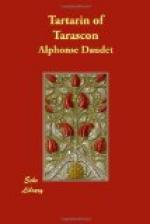The other passengers on the coach were a mixed lot. A Trappist monk, some Jewish merchants, two Cocottes, returning to their unit, the third Hussars, and a photographer from Orleansville.
No matter how charming and varied the company, Tartarin did not feel like chatting and remained silent, his arm hooked into the arm-strap and his weaponry between his knees.... His hurried departure, the dark eyes of Baia, the dangerous chase on which he was about to engage, these thoughts troubled his mind, and also there was something about this venerable stage-coach, now domiciled in Africa, which recalled to him vaguely the Tarascon of his youth. Trips to the country. Dinners by the banks of the Rhone, a host of memories.
Little by little it grew dark. The guard lit the lanterns. The old coach swayed and squeaked on its worn springs. The horses trotted, the bells on their harness jingling, and from time to time there sounded the clash of ironmongery from Tartarin’s arms chest on the top of the coach.
Sleepily Tartarin contemplated his fellow passengers as they danced before his eyes, shaken by the jolting of the coach, then his eyes closed and he heard no more, except vaguely, the rumble of the axles and the groaning of the coach sides....
Suddenly an ancient female voice, rough, hoarse and cracked, called the Tarasconais by name: “Monsieur Tartarin!... Monsieur Tartarin!” “Who is calling me?” “It is I, Monsieur Tartarin, don’t you recognise me?... I am the stage-coach which once ran... it is now twenty years ago... the service from Tarascon to Nimes.... How many times have I carried you and your friends when you went hat shooting over by Joncquieres or Bellegarde... I didn’t recognise you at first because of your bonnet and the amount of weight you have put on, but as soon as you began to snore, you old rascal, I knew you right away.” “Bon!... Bon!” Replied Tartarin, somewhat vexed, but then softening, he added: “But now, my poor old lady, what are you doing here?” “Ah! My dear M. Tartarin, I did not come here of my own free will I can promise you. Once the railway reached Beaucaire no one could find a use for me so I was shipped off to Africa... and I am not the only one, nearly all the stage-coaches in France have been deported like me; we were found too old fashioned and now here we all are, leading a life of slavery.” Here the old coach gave a long sigh, then she went on: “I can’t tell you monsieur Tartarin how much I miss my lovely Tarascon. These were good times for me, the time of my youth. You should have seen me leaving in the morning, freshly washed and polished, with new varnish on my wheels, my lamps shining like suns and my tarpaulin newly dressed with oil. How grand it was when the postillion cracked his whip and sang out, ’Lagadigadeou, la Tarasque, la Tarasque’ and the guard, with his ticket-punch slung on its bandolier and his braided cap tipped over one ear, chucked his little yapping dog onto the tarpaulin of the coach-roof and scrambled up himself crying ‘Let’s go!... Let’s go!’ Then my four horses would start off with a jingle of bells, barking and fanfares. Windows would open and all Tarascon would watch with pride the stage-coach setting off along the king’s highway.




